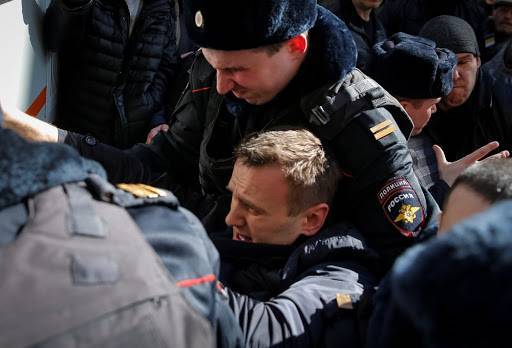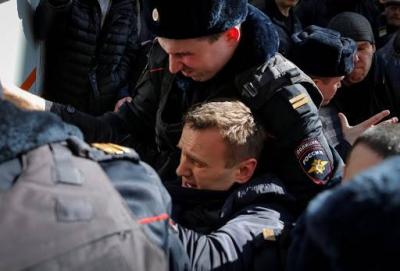Russian opposition figure Alexei Navalny has called on Russian citizens to take to the streets in demonstrations against the authorities in his country.
The French news agency reported today that opposition leader Alexei Navalny urged Russian citizens to protest against the authorities. A Russian court ruled to extend Navalny's detention until February 15. The Russian Interior Ministry announced that Navalny would be held in prison for 30 days in conjunction with the United Nations Human Rights Commission's call for his immediate release.
It is noted that Russian police arrested Navalny upon his arrival at Sheremetyevo Airport in Moscow as he was preparing to stamp his passport. Four police officers approached Navalny at the passport control area of Sheremetyevo Airport and asked him to accompany them, allowing his wife to pass through.
Russian prison authorities justified Navalny's arrest upon his arrival in Moscow by claiming he violated the terms of a suspended prison sentence issued against him, indicating that Navalny would remain detained until the court decides on his case.
Navalny stated to journalists on the plane returning to Russia that he wanted to thank the nurses and doctors who treated him in Germany for the effects of the nerve agent "Novichok," emphasizing that the day of his return to Russia was "the best day he has had in the past five months," declaring, "This is my country... I am not afraid."
In a video recording released today by Navalny's spokesperson, he deemed holding a session at a police station in Moscow to consider extending his detention as an "absolute absence of law" after he was arrested upon entering the country.
Navalny's story goes back to August 20, when he fell seriously ill during a flight from Siberia to Moscow as part of an election campaign. He was hospitalized in Omsk for 48 hours before being transferred to Berlin in a coma after pressure from his close associates.
Navalny left the hospital in early September. Three European laboratories concluded that he was poisoned with the Novichok substance, developed during the Soviet era for military purposes. This finding was confirmed by the Organization for the Prohibition of Chemical Weapons despite repeated denials from Moscow.
The Russian opposition leader Alexei Navalny announced that he would return to Russia on Sunday after several months in Germany recovering from the alleged poisoning, despite the possibility of being arrested by Russian judicial authorities.




